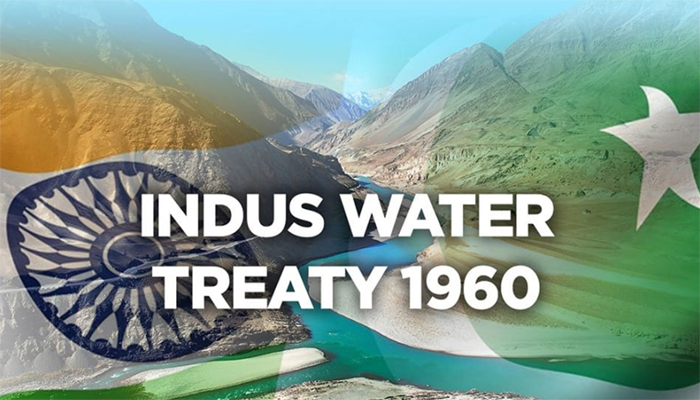The Indus Waters Treaty (IWT), signed on September 19, 1960, is one of the most significant water-sharing agreements in the world.
Brokered by the World Bank, the treaty was established between India and Pakistan to manage and divide the waters of the Indus River system, which includes six rivers: the Indus, Jhelum, Chenab, Ravi, Beas, and Sutlej. Under the terms of the treaty, India received control over the eastern rivers—Ravi, Beas, and Sutlej—while Pakistan was granted rights to the western rivers—Indus, Jhelum, and Chenab. This arrangement has been vital for Pakistan, as around 80% of its water supply comes from these rivers, which support agriculture, energy production, and drinking water needs.
The historical context of the treaty is rooted in the 1947 partition of British India. This geopolitical split divided the Indus Basin between the two new nations. India inherited control of the upstream areas where the rivers originated, while Pakistan’s extensive irrigation infrastructure was downstream. This created immediate tension and led to disputes over water usage.
The issue became so serious that it threatened to provoke military conflict, prompting the World Bank to intervene and facilitate negotiations. After nearly a decade of talks, Indian Prime Minister Jawaharlal Nehru and Pakistani President Ayub Khan signed the agreement in Karachi. Despite enduring three full-scale wars and several military skirmishes, the treaty has largely held and is often hailed as a rare example of successful conflict resolution between two bitter rivals.
Pakistan's dependence on the western rivers cannot be overstated. The country is among the most water-stressed in the world, with an agricultural economy that relies on irrigation from these rivers for over 90% of its crops. Hydroelectric projects like the Tarbela and Mangla dams further highlight how crucial uninterrupted water flow is for electricity production. For Pakistan, the IWT is not just a treaty but a lifeline. It provides a legal framework to contest any upstream activity by India that might reduce water availability or violate the agreement’s terms.
Tensions between the two countries have once again surged in April 2025, following a deadly attack in Pahalgam, a popular tourist spot in Indian-occupied Kashmir. The incident left 26 people dead and 17 wounded. The Indian government quickly blamed Pakistan, claiming the attack was another case of cross-border terrorism supported by Islamabad. Pakistan vehemently denied involvement, calling it a false flag operation and expressing condolences for the victims. In response to the attack, India undertook a series of drastic measures, including the suspension of the Indus Waters Treaty—a move that sent shockwaves through diplomatic and security circles.
The Indian government’s announcement on April 23, 2025, to suspend the IWT marks an unprecedented step in the countries’ strained history. While India has previously hinted at using the treaty as leverage, it had never before acted on this threat. This suspension has raised alarm in Pakistan, where authorities fear that it could signal the beginning of a broader strategy to exert economic and environmental pressure. Pakistan’s National Security Committee, led by Prime Minister Shehbaz Sharif, convened on April 24 to assess the situation and formulate a measured yet firm response. The committee is reportedly considering a range of diplomatic, legal, and strategic options.
India’s additional retaliatory measures included expelling Pakistani diplomats, downgrading diplomatic ties, and shutting down a major land border crossing. Social media platforms in India also blocked official accounts linked to the Pakistani government. Indian Prime Minister Narendra Modi, in a statement to the press, vowed to pursue those responsible for the Pahalgam attack “to the ends of the Earth,” signaling a hardline approach.
Analysts suggest that India’s suspension of the IWT is driven by both strategic and political motives. By targeting Pakistan’s water supply, India is applying pressure on one of its most vulnerable fronts. The move also serves to galvanize domestic support by appearing strong on national security, especially in the lead-up to elections. However, such steps carry enormous risks. Any tampering with water flow, even if symbolic, could be interpreted as an act of aggression and might provoke retaliation.
The Indus Waters Treaty has been one of the few steady elements in an otherwise volatile India-Pakistan relationship. The Permanent Indus Commission, set up under the treaty, has allowed both sides to address grievances and manage water disputes through dialogue. Cases such as the Kishanganga and Ratle hydroelectric projects have previously gone through international arbitration, with both countries agreeing to abide by verdicts. The treaty has helped prevent water disputes from spiraling into open conflict and is widely regarded as a stabilizing force in South Asia.
Suspending the treaty undermines this stability and could have far-reaching consequences. Disruptions in water flow would not only damage Pakistan’s agricultural output and energy generation but could also lead to severe humanitarian and environmental crises. Furthermore, India’s unilateral action risks setting a dangerous international precedent where bilateral treaties can be discarded amid political crises.
In the face of rising tensions, there are growing international calls for restraint. Diplomats and global leaders have urged both countries to return to dialogue and maintain the sanctity of international agreements. For the treaty to remain effective, both India and Pakistan must recommit to its terms and resist the urge to weaponize essential resources like water.
As of now, the future of the Indus Waters Treaty hangs in the balance. With nationalism and mistrust running high on both sides, the coming days will be critical. The actions taken—or avoided—could determine whether South Asia steps back from the brink or edges closer to conflict. For Pakistan, the situation is especially urgent, as any disruption to its water supply could have immediate and devastating consequences. The world watches closely, hoping that diplomacy will prevail over provocation.









